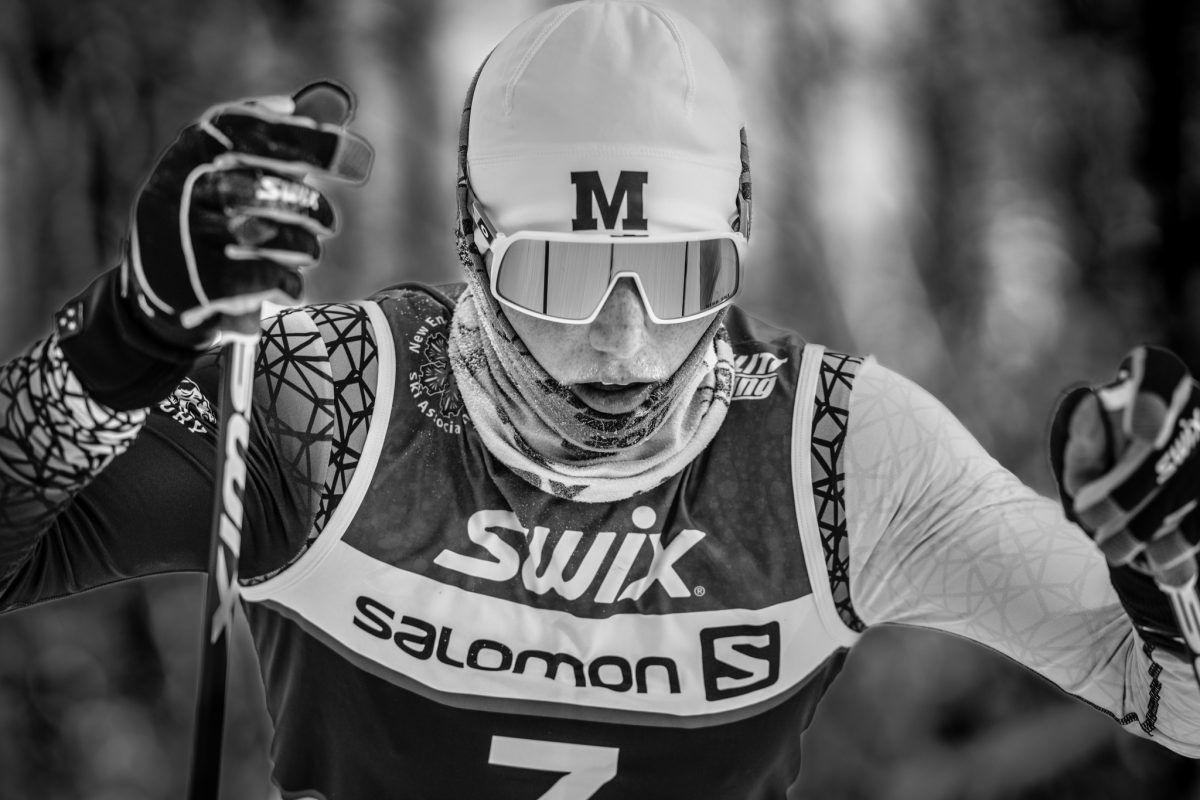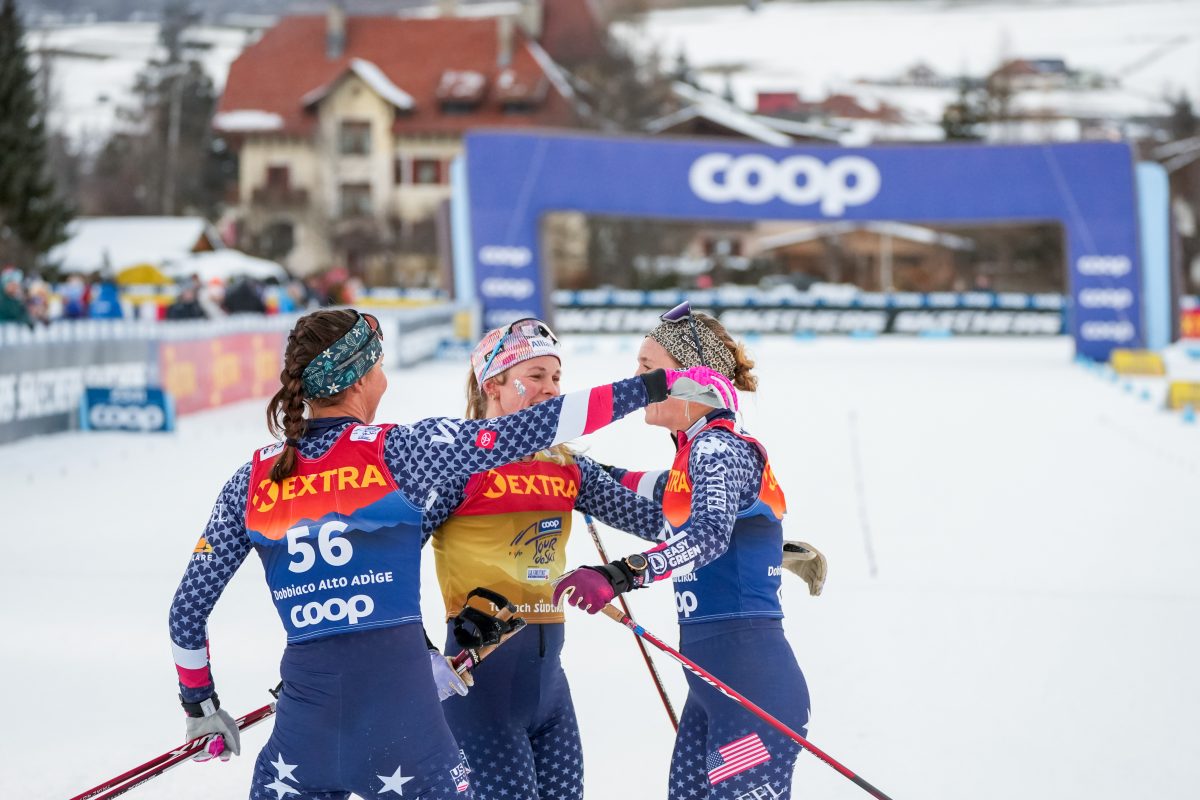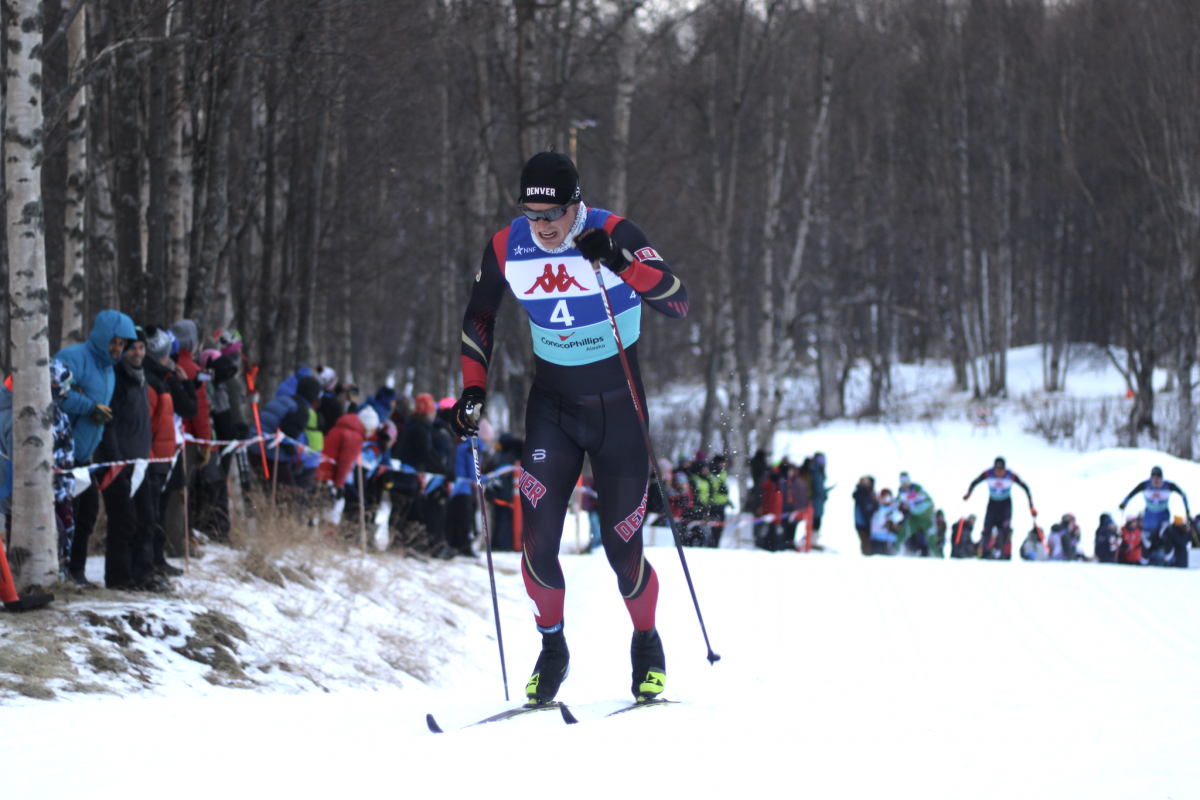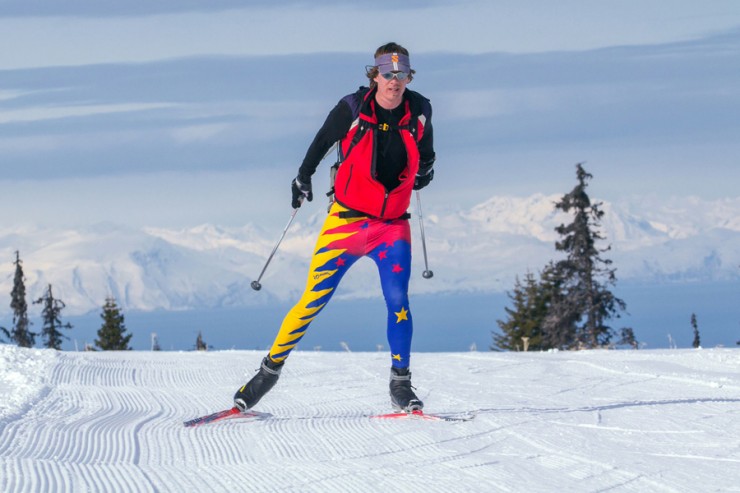
A towering bundle of energy was extinguished on Dec. 12, when Nordic Skiing Association of Anchorage (NSAA) President Lars Spurkland died of an aneurysm.
Spurkland, 39, was known widely throughout the Anchorage outdoors community for his towering physique (he was 6-foot-7), good nature and boundless energy.
“‘What didn’t he do?’ might be a better question to ask,” his younger brother, Jan Spurkland, wrote in an email to FasterSkier. “Lars coached high school kids, taught beginner ski lessons, served as a race volunteer, and jumped in any race that he was in town for. ”
Jan recounted a story of skiing at National Masters Championships this past spring, when his older brother spent the day setting up the race, did the race, and then, while everyone else was resting after the race, jumped on a snowmachine and picked up the course markers.
But within the greater Anchorage community, Spurkland was known for much more than being a cross-country skier. When the Alaska Dispatch News published an article about his death, it featured a photo of him carving a telemark turn at Turnagain Pass.
The long comment thread on the article is filled with remembrances of his skill as an engineer (Spurkland was owner and principle engineer at Spurkland Engineering, which was founded by his father, Tobben Spurkland); his grace and skill as a competitor, going all the way back to his junior career and racing at Dimond High School in the early 90’s; his skill as a telemark skier; and the effect he had on young peoples’ lives as a ski coach.
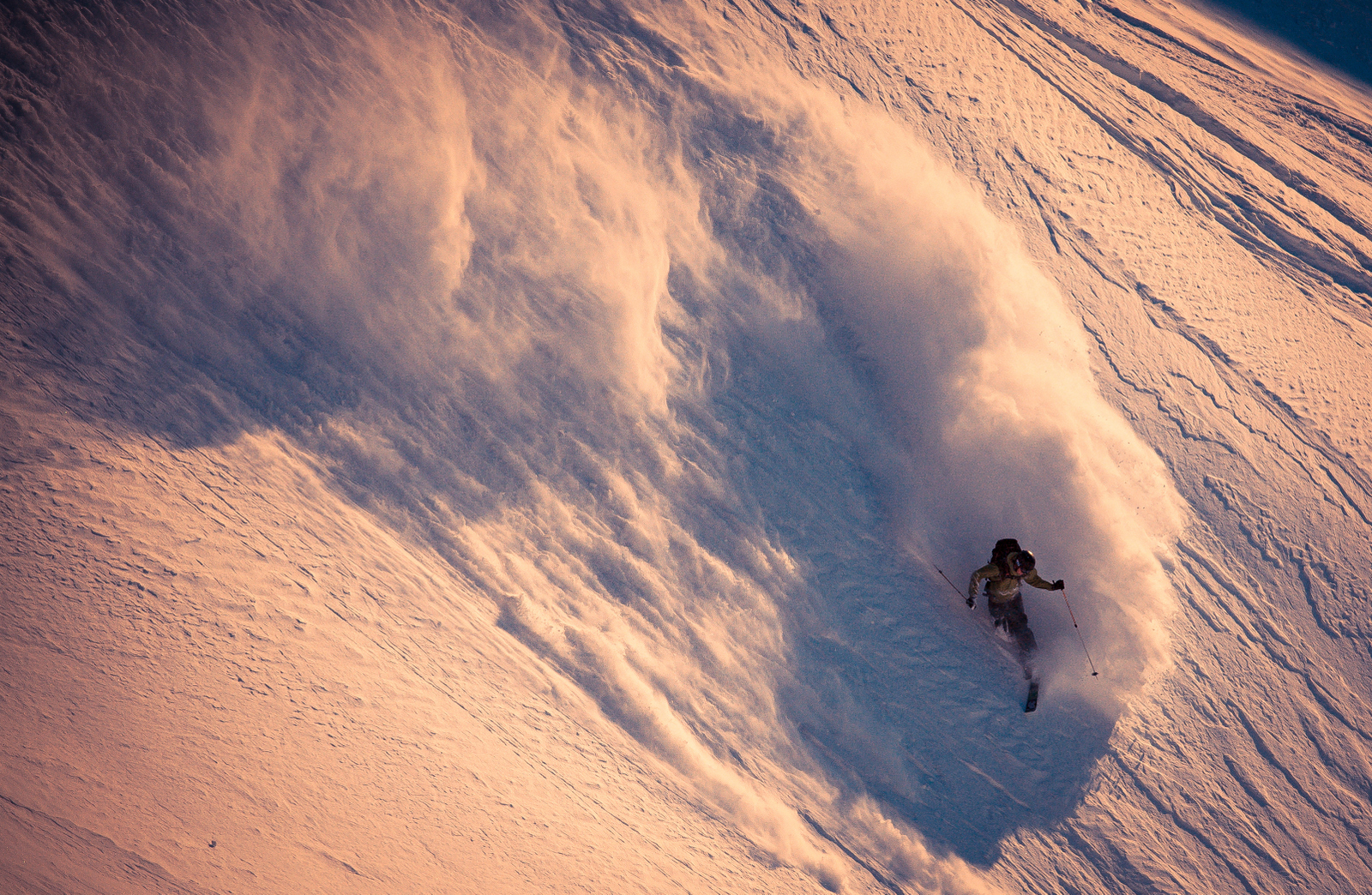
“He had a passion for skiing that covered all disciplines,” his brother explained. “He never seemed to worry about his fitness, or where he would place on a result sheet, he simply loved to be out there skiing.”
‘Tele skiing was his identity’
“Lars was a tele skier born and bred,” Jan continued. “He tried to get out on his tele boards several times a week, with a short list of local backcountry runs that he could steal in after quitting work early. It was also through tele skiing that he met his future wife, Raye Ann.”
“Lars is so exceptional,” Spurkland’s wife, Raye Ann Neustel, wrote in an email.
Neustel and Spurkland traveled extensively, going on backcountry ski trips in British Columbia, Colorado, the Sierras, the Mt. Blanc massif and other areas in Europe. They took peak-bagging trips to Mexico, Peru and the Himalayas. In 2010 they summited and skied Denali together.
“Lars’ priority was to recreate,” she continued, alternating between present and past tense when discussing Spurkland. “[He] was an exceptional athlete.”
“I really do believe that Lars enjoyed himself the most high in the mountains, and he spent as much time there as he could,” Jan wrote.
“He had a passion for skiing that covered all disciplines. He never seemed to worry about his fitness, or where he would place on a result sheet, he simply loved to be out there skiing.” — Jan Spurkland, about his older brother Lars
Alaska Dispatch commenter Billy Finley posted about a day of after-work backcountry skiing in bad conditions in the Chugach Front Range, just outside Anchorage. He wrote about what Spurkland did while Finley tentatively made his way down steep, icy terrain.
“Lars waited patiently,” he wrote, “and when I was settled he slid off the top onto solid 40 degree ice. He took two turns and then spun around backwards and skied the rest of the run. Backwards. In tele skis. Perfectly.”
Spurkland wasn’t just a skier. Longtime friend and noted-Anchorage mountaineer Sam Johnson recounted in a recent Facebook post the grim tale of a 2003 attempt on Mt. Foraker early in their climbing careers. He and Spurkland were trying to climb a ridge on the giant mountain, but during the ascent a massive cornice broke underneath Spurkland, sending him tumbling into space. Johnson leapt off the other side of the ridge, a desperate maneuver known as the “Fairbanks belay.” Only the counterbalance of the two men’s weight with the rope over the ridge held them on the mountain.
“I knew, just knew, that we were both going to die, and I imagine Lars did too,” Johnson wrote.
But Spurkland was unhurt in his massive, upside-down fall off the mountain and was able to climb back up to the ridge.
“Thanks Lars for changing my life,” Johnson concluded. “I’m glad you got another 11 years.”
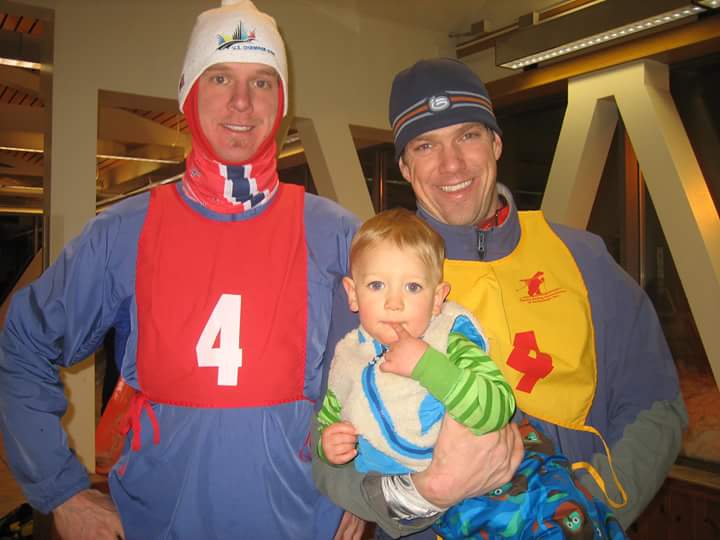
‘I wish I knew how to inspire the next generation to be more like him’
Spurkland’s legacy, however, will not just be memories of days in the mountains, but also in the way he shaped the lives of others.
As is the case for so many people, Tamra Kornfield did not consider the influence Spurkland had on her life until this week.
“Lars has, unexpectedly, been one of the most influential people on where my professional life has taken me,” she wrote in an email. “I met Lars when we volunteered together at U.S. Nationals helping set up the course. … The next fall I was in grad school and ran into Lars who said he was desperately seeking a female assistant coach for the East High Ski Team.
“I said, ‘Absolutely not, I don’t have time for that,’ ” Kornfield continued. “And he said I could be the ‘fun’ coach and that it would be a good time and an easy gig. So I said yes, and never regretted it for a moment. Coaching with Lars at East was hands-down the BEST ‘job’ I’ve ever had. Lars was the most easy-going coach who loved what he was doing. I never once saw him fazed or stressed out about anything, from wax to missed starts. He simply went with the flow and encouraged everyone to have as good a time as he was having.”
Spurkland’s influence on Kornfield’s life did not stop there, however. She admired the flexibility he had in his engineering work.
“There were plenty of days when Lars would go out for a back country ski and still make it to practice at East by 2pm. I coached for two years and then decided it was time to get an engineering job,” she wrote.
However, after a couple of years of work as an engineer, Kornfield wasn’t sure it was for her. Spurkland continued to to encourage her to pursue what made her happy, offering her a position as program director at the NSAA.
“I had a serious talk with him about ruining my chances at becoming an engineer. He said he too had taken a break from engineering and still earned his [professional engineering license] after returning to work. He added that I would be building excellent skills that would be beneficial to any future work I chose to do. I think he also knew how much I would enjoy working at NSAA,” she wrote.
“He was probably the best person I’ve ever met at balancing fun and work. Once I began working at NSAA I realized how many hours he actually put into the Ski Club. I wish I knew how to inspire the next generation to be more like him.”
‘A MOUNTAIN of a man’
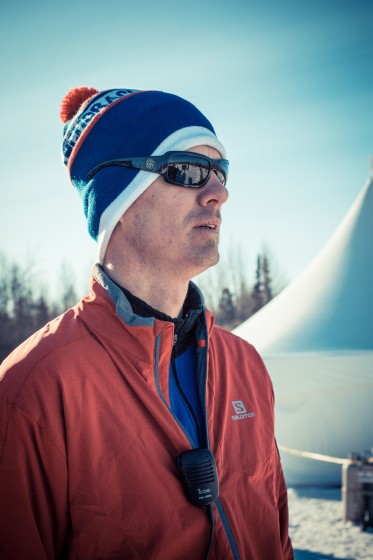
But in the weeks before his death, Spurkland had not been feeling like himself. In a blog post titled “#larswouldgo” sister-in-law Megan Spurkland wrote that Spurkland’s illness came to a head on Wednesday, Dec. 10:
“On Wednesday morning, for the first time, Lars didn’t go. I woke up with an urge to talk to him. I couldn’t picture sitting in a room to talk, so I invited him for a ski.”
Spurkland didn’t go, saying he had a doctor’s appointment, and didn’t feel well. That same day a blood vessel in his brain ruptured, causing a massive intracranial bleed.
“The doctor would [have called] on Friday afternoon to tell Lars that he had Leukemia,” Megan wrote in her blog post. “On Friday morning Lars’ family would be holding vigil around him as his heart slowly came to a stop.”
The acute myeloid leukemia likely caused the aneurysm, according to Megan. The pressure from the bleeding put pressure on Spurkland’s brain stem, stopping his heart.
‘Just about the most likable guy out there’
Kathy Sarns had been Spurkland’s coach in Junior Nordics in the 1980s, and when she recently needed her well and septic tested, she hired Spurkland’s engineering firm. When she got the invoice, she was surprised to see that Spurkland had deducted the “Anchorage Junior Nordic League Coaches Discount.”
“This kind gesture brought tears to my eyes,” she wrote in an email, “[I was] moved that he remembered those JN days from when he was a kid — so many years ago.”
As an adult, Spurkland worked hard for the ski programs he grew up with. The day after his death, an impromptu high-school ski race was organized after a sanctioned race was canceled. It was called the Lars Spurkland Scramble.
“Lars did so much for our Nordic community up here in Anchorage,” according to his friend Charlie Renfro. “Because of his high school coaching, race organization and his involvement with NSAA, he was interacting with a huge number of people almost every day during the winter — and everyone liked him.”
“He [interacted] with a huge number of people almost every day during the winter — and everyone liked him.” — Charlie Renfro, about Lars Spurkland
“Lars would always want a community of amazing skiers to inspire each other and create new skiers,” Neustel wrote of her husband. “Lars found humor in every situation, and had a graceful way of not ever coming close to having an ego.”
“He never let anyone anger him,” she continued. “[Never] did he ever consider anything other than instant forgiveness. He was the gentle giant, many people have referred to him as such.”
“He was a great friend to many of us and he will be dearly missed by all who knew him,” Renfro said of his friend.
“When someone leaves,” Sarns concluded her email, “what we remember most ‘is the way they made us feel,’ and that is a gift that no one can take. Thank you Lars.”

